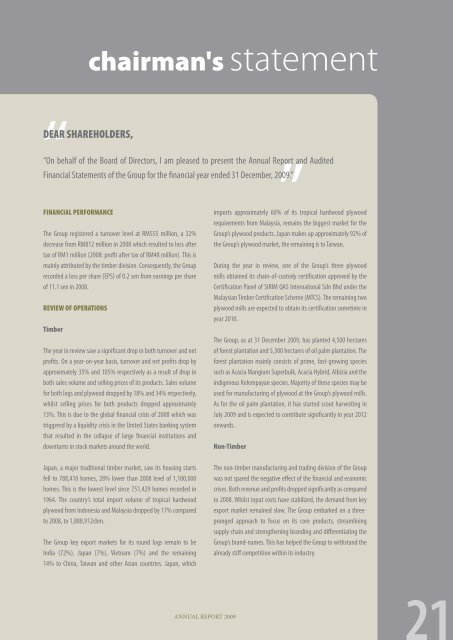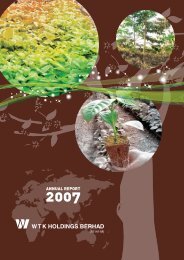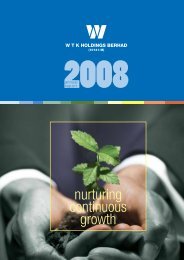notes to the financial - WTK Holdings Berhad
notes to the financial - WTK Holdings Berhad
notes to the financial - WTK Holdings Berhad
Create successful ePaper yourself
Turn your PDF publications into a flip-book with our unique Google optimized e-Paper software.
FINANCIAL PERFORMANCE<br />
chairman's statement<br />
“<br />
DEAR SHAREHOLDERS,<br />
The Group registered a turnover level at RM555 million, a 32%<br />
decrease from RM812 million in 2008 which resulted <strong>to</strong> loss after<br />
tax of RM1 million (2008: profi t after tax of RM48 million). This is<br />
mainly attributed by <strong>the</strong> timber division. Consequently, <strong>the</strong> Group<br />
recorded a loss per share (EPS) of 0.2 sen from earnings per share<br />
of 11.1 sen in 2008.<br />
REVIEW OF OPERATIONS<br />
Timber<br />
The year in review saw a signifi cant drop in both turnover and net<br />
profi ts. On a year-on-year basis, turnover and net profi ts drop by<br />
approximately 35% and 105% respectively as a result of drop in<br />
both sales volume and selling prices of its products. Sales volume<br />
for both logs and plywood dropped by 18% and 34% respectively,<br />
whilst selling prices for both products dropped approximately<br />
13%. This is due <strong>to</strong> <strong>the</strong> global fi nancial crisis of 2008 which was<br />
triggered by a liquidity crisis in <strong>the</strong> United States banking system<br />
that resulted in <strong>the</strong> collapse of large fi nancial institutions and<br />
downturns in s<strong>to</strong>ck markets around <strong>the</strong> world.<br />
Japan, a major traditional timber market, saw its housing starts<br />
fell <strong>to</strong> 788,410 homes, 28% lower than 2008 level of 1,100,000<br />
homes. This is <strong>the</strong> lowest level since 751,429 homes recorded in<br />
1964. The country’s <strong>to</strong>tal import volume of tropical hardwood<br />
plywood from Indonesia and Malaysia dropped by 17% compared<br />
<strong>to</strong> 2008, <strong>to</strong> 1,888,912cbm.<br />
The Group key export markets for its round logs remain <strong>to</strong> be<br />
India (72%), Japan (7%), Vietnam (7%) and <strong>the</strong> remaining<br />
14% <strong>to</strong> China, Taiwan and o<strong>the</strong>r Asian countries. Japan, which<br />
”<br />
imports approximately 60% of its tropical hardwood plywood<br />
requirements from Malaysia, remains <strong>the</strong> biggest market for <strong>the</strong><br />
Group’s plywood products. Japan makes up approximately 92% of<br />
<strong>the</strong> Group’s plywood market, <strong>the</strong> remaining is <strong>to</strong> Taiwan.<br />
“On behalf of <strong>the</strong> Board of Direc<strong>to</strong>rs, I am pleased <strong>to</strong> present <strong>the</strong> Annual Report and Audited<br />
Financial Statements of <strong>the</strong> Group for <strong>the</strong> fi nancial year ended 31 December, 2009.”<br />
During <strong>the</strong> year in review, one of <strong>the</strong> Group’s three plywood<br />
mills obtained its chain-of-cus<strong>to</strong>dy certifi cation approved by <strong>the</strong><br />
Certifi cation Panel of SIRIM QAS International Sdn Bhd under <strong>the</strong><br />
Malaysian Timber Certifi cation Scheme (MTCS). The remaining two<br />
plywood mills are expected <strong>to</strong> obtain its certifi cation sometime in<br />
year 2010.<br />
The Group, as at 31 December 2009, has planted 4,500 hectares<br />
of forest plantation and 5,300 hectares of oil palm plantation. The<br />
forest plantation mainly consists of prime, fast-growing species<br />
such as Acacia Mangium Superbulk, Acacia Hybrid, Albizia and <strong>the</strong><br />
indigenous Kelempayan species. Majority of <strong>the</strong>se species may be<br />
used for manufacturing of plywood at <strong>the</strong> Group’s plywood mills.<br />
As for <strong>the</strong> oil palm plantation, it has started scout harvesting in<br />
July 2009 and is expected <strong>to</strong> contribute signifi cantly in year 2012<br />
onwards.<br />
Non-Timber<br />
ANNUAL REPORT 2009<br />
The non-timber manufacturing and trading division of <strong>the</strong> Group<br />
was not spared <strong>the</strong> negative eff ect of <strong>the</strong> fi nancial and economic<br />
crises. Both revenue and profi ts dropped signifi cantly as compared<br />
<strong>to</strong> 2008. Whilst input costs have stabilized, <strong>the</strong> demand from key<br />
export market remained slow. The Group embarked on a threepronged<br />
approach <strong>to</strong> focus on its core products, streamlining<br />
supply chain and streng<strong>the</strong>ning branding and diff erentiating <strong>the</strong><br />
Group’s brand-names. This has helped <strong>the</strong> Group <strong>to</strong> withstand <strong>the</strong><br />
already stiff competition within its industry.





